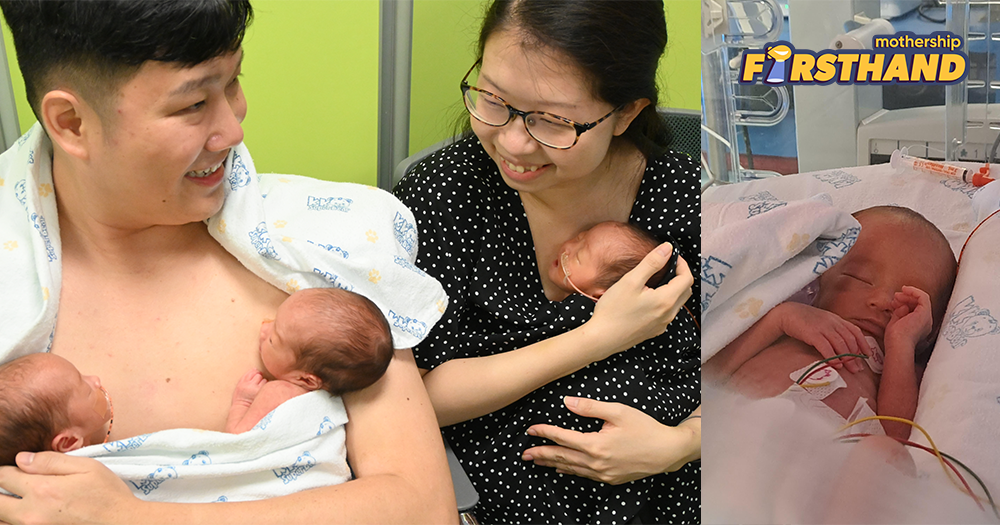"I hope you don't hear the babies' crying later," Liew Tian En prefaces our interview with an apologetic laugh.
A year ago, he and his wife, Hozanna Ngoh, were struggling to conceive. They'd been trying for seven years.
Now, they're the proud parents of two-month-old triplets — Irie, Caius, and Aden — in a happy battle against endless midnight feeds and diaper changes.
As the Liews approach their first Christmas together, we speak about their rollercoaster journey from unfettered couple, to family of five.
As told to Ilyda Chua
How did you two meet?
Tian En: We're church friends.
Hozanna: 37 this year. Same age.
Tian En: On December 7, it'll be 10 years of marriage. We've been trying [for a child] for about 7 years.
How did you end up with triplets?
Hozanna: It's not considered natural in that sense. We conceived via IUI, intrauterine insemination. It's one of the types of fertility assistance.
So with any fertility assistance, there'll always be a higher risk of multiples.
But this was our third round of IUI — the first two failed. So to me, even if you told me that there's a risk of multiples, before this it was zero right? Zero chance of any success.
In my mind even if there were multiples I would have thought twins at most lah.
When we got pregnant and we went for our first scan...immediately we could see three different sacs.
That was definitely a shocker. (laughs)
Tian En: It was mixed feelings. We were excited, but I was so stunned. I was like okay...there's one, two, three.
We are really thankful that she's pregnant, but I remember my first thought was "oh dear, how are we going to manage three?"
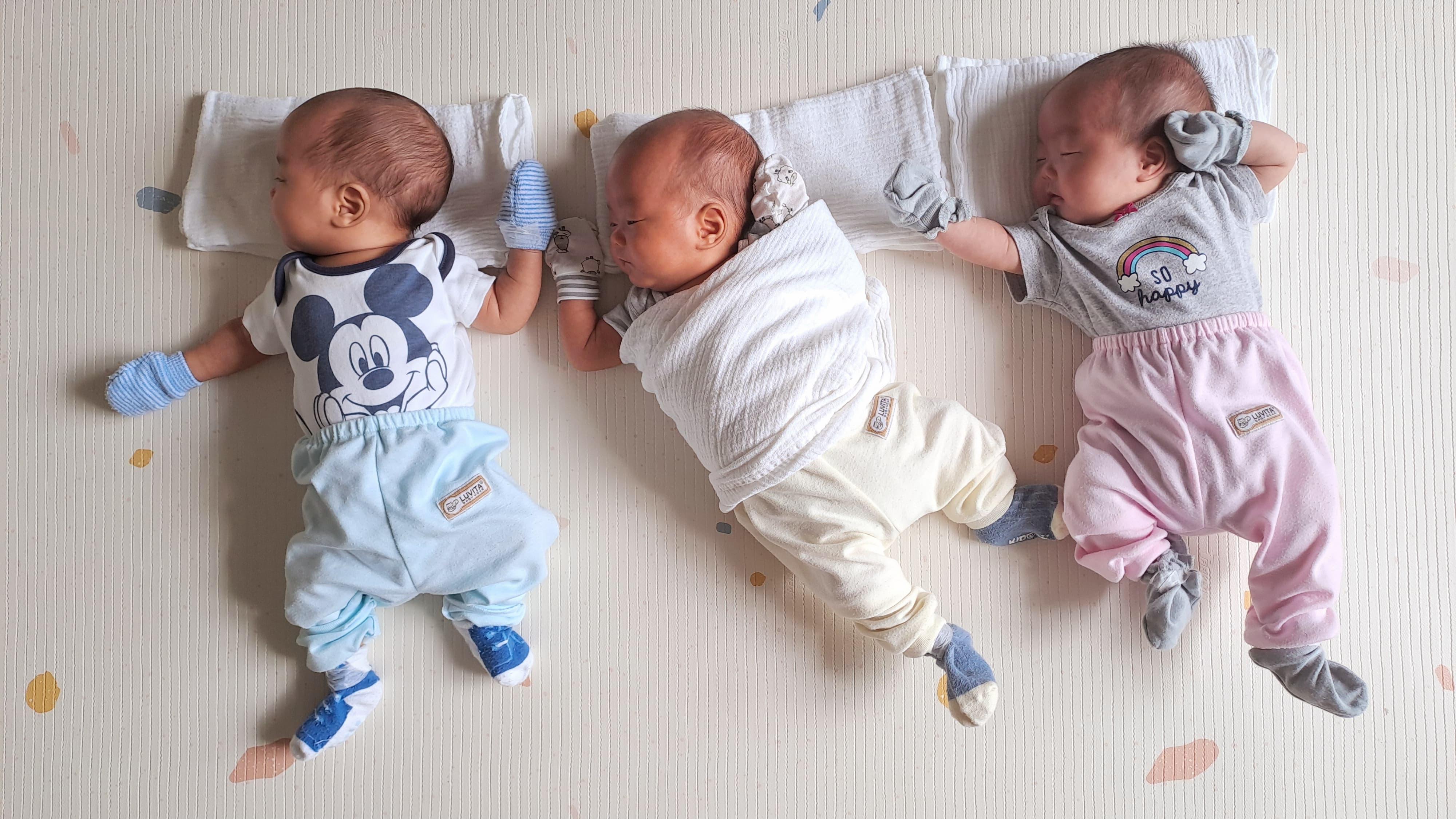 Photo from Hozanna and Tian En
Photo from Hozanna and Tian En
Were you anxious?
Hozanna: We've been trying for a while right, so to finally get pregnant, I was very happy.
But having three also meant that we didn't know how the pregnancy might go. It would be higher risk. And we could lose them also.
With any higher-order (multiple) pregnancy, there's a higher risk of miscarriage. Because it depends on whether my body, my uterus can hold them.
[There were also] risks of going into preterm labour, conditions like preeclampsia and gestational diabetes. And I did end up getting gestational diabetes.
So after our very first scan, when we walked out...we were kind of somber. Kind of, you know, not sure what to make of that news.
Tian En: Yeah, we were concerned about all the different possibilities, or worst-case scenarios which were very real.
Logistics-wise, we're very thankful and grateful to friends and family for a lot of hand-me-downs. Because everything we needed three right? Like diapers, wet wipes, milk powder. (laughs)
Hozanna: But symptoms-wise it was almost like a regular pregnancy.
The biggest difference was that [my belly] grew a lot faster and bigger. I think the early second trimester was when the belly exponentially grew. That was a worry for me because I'm quite petite, I'm 153cm.
So I was like, how can I carry three babies in me?
Tian En: Yeah, it was huge man. (laughs)
How did the birth go? Were there any complications?
Hozanna: We delivered by C-section. Natural birth wasn't an option, I don't think they do that for triplets at all because it's too high-risk.
It was planned for 35 weeks. So from the beginning, we knew they would be premature babies, and we expected them to be in the hospital for a while. We just didn't know how long.
But as we reached the third trimester, the checks showed that one of our babies started to slow down in growth.
In the end we delivered at 33 weeks. We went in for a routine check, and another baby had low-ish amniotic fluid.
We didn't know what other things would pop up, so they decided to [move the delivery] earlier. It was decided on that Wednesday that I'd deliver on Friday (Oct. 6).
So we didn't expect that.
Tian En: But the medical team was really good. We were a bit like oh, okay [when the doctor told us about the early delivery], but at that point we trusted her.
Because she has been just fantastic for my wife, supporting her on this journey.
So thank God that the procedure went really well. It started 9:24am. Then 9:25, 9:26, then all three of them came out already.
How did you feel after seeing the babies for the first time?
Hozanna: For me, my very first view of the babies was just their legs. (laughs)
Because the doctors want to very quickly get them attended to right? So it was just like, this is number one, this is number two.
I just quickly saw their legs above the drapes, and then they got brought away.
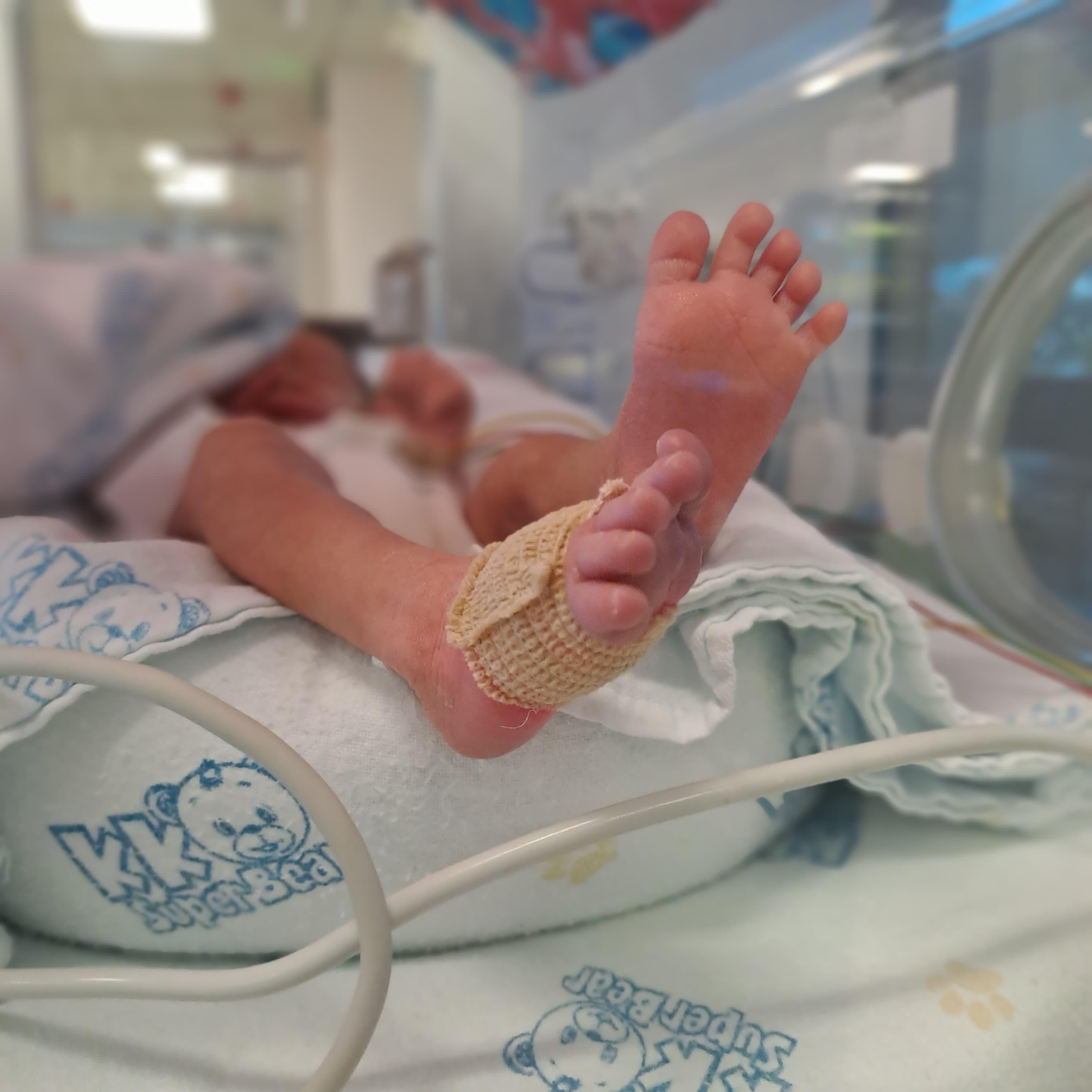 Photo from Hozanna and Tian En
Photo from Hozanna and Tian En
Tian En: There was so much worry, anxiety...but yet, eh, here they are.
So I was a bit speechless. I think the nurse was thinking like, "what's wrong with this guy, he just stare at them". (laughs)
But just, wow. After thirty over weeks, we made it.
Then straight after that, when we went to the NICU, my mind was like: I better take down notes. Because next thing when I see my wife, she's going to want to find out [what's happening].
So I told myself, you better write down every single detail. Then report back to my wife.
What were the first few weeks like?
Hozanna: The very first time I saw them was on the phone. [My husband] showed it to me after I got to the ward.
I remember I was crying very badly, but I was telling him it's just hormonal. (laughs)
I was happy that they're out and being taken care of...but also you know, just seeing them on tubes and all the things around, the apparatus.
No matter how much people tell you to be prepared for it, it always feels jarring to see the babies so young and fragile.
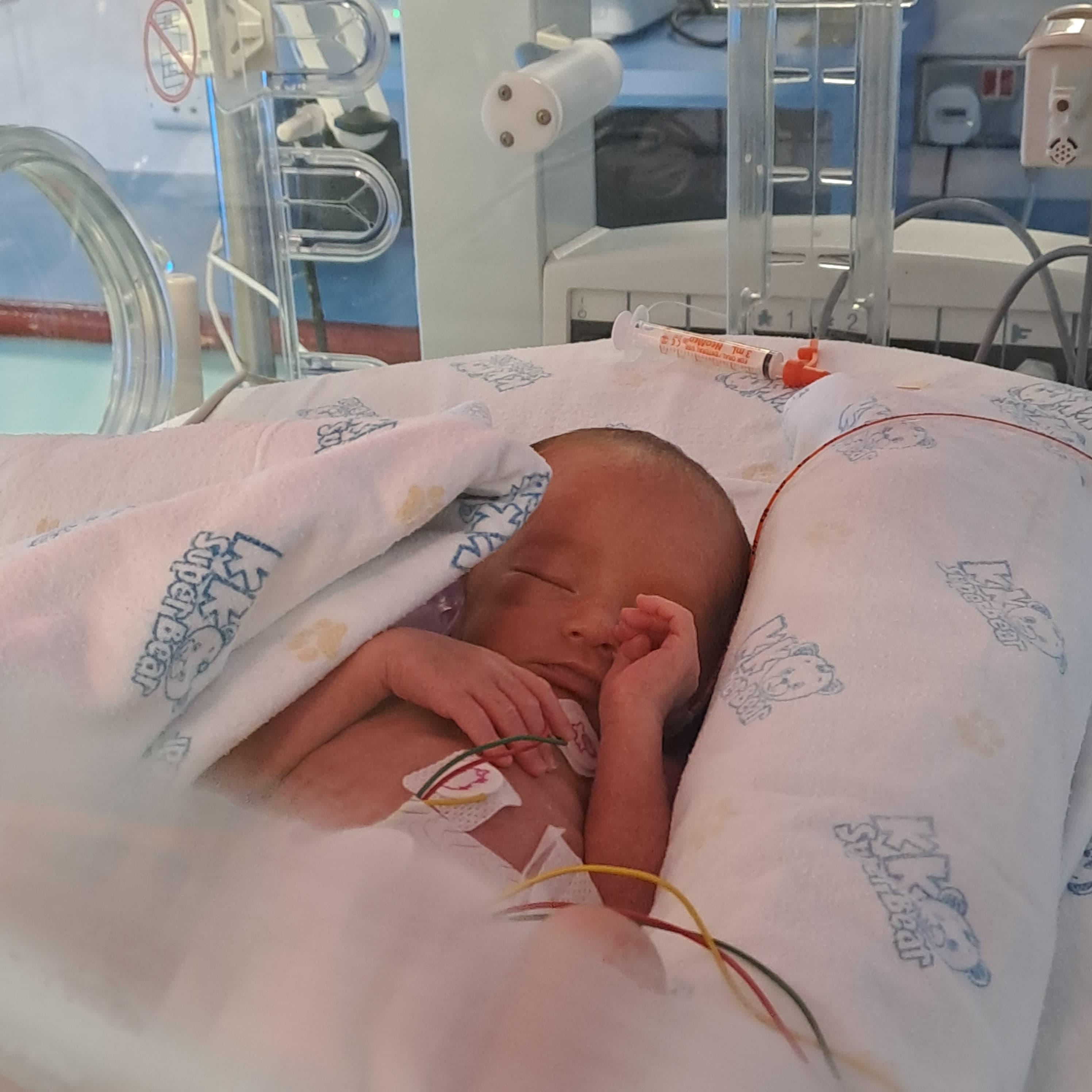 Photo from Hozanna and Tian En
Photo from Hozanna and Tian En
And I think it's the same experience of every mum in the NICU, like right after surgery they really want to see the baby as soon as possible.
So the next day when the nurses helped me try to sit up and make my way to the wheelchair, that's really my main motivation. To be wheeled to the NICU and nursery to see them.
Seeing them in person was just emotional overload. Even after the first time, every time I saw them, I kept thinking how they were inside me, and they're outside now.
They were born seven weeks premature. I looked at them and I was just amazed that they're fully-formed babies — they're all there, their organs are all there.
Tian En: In total, they spent 19 days in the hospital.
If you think about it, that's almost two-thirds of a month. Normally for mums, they'll just be resting at home.
But for us, we just had to figure things out. We need to pump, we need to feed, we need to think about doing kangaroo care.
Every time we went to the hospital, we'd discuss [how to do kangaroo care]. We'd do two of them concurrently, then my wife would go pump, then we'd do the last [baby].
Then by the time we finished, time's up already. We'd only leave once the announcement played, like "visiting hours are over". (laughs)
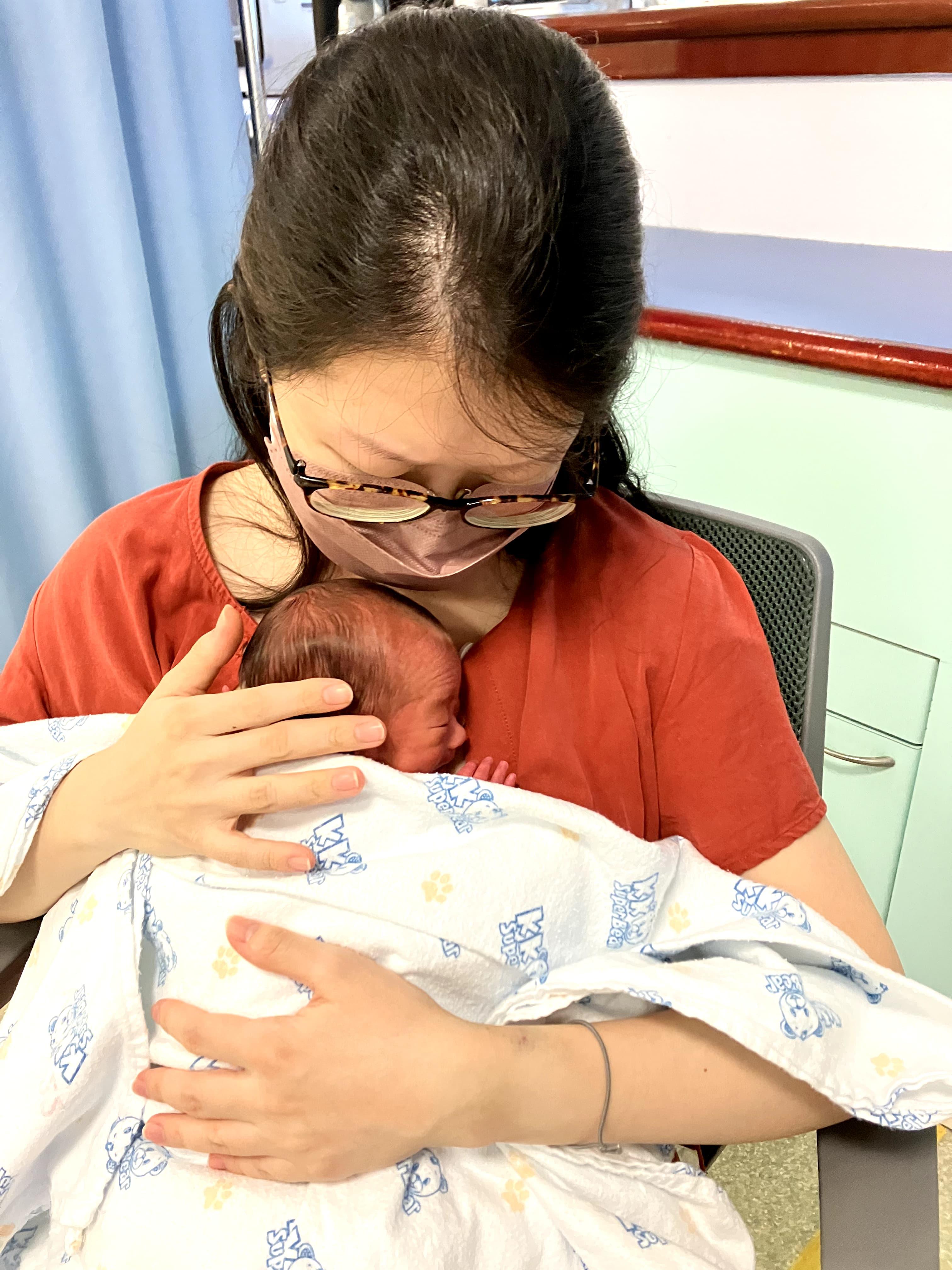 Photo from Hozanna and Tian En
Photo from Hozanna and Tian En
Sorry, kangaroo care?
Tian En: I didn't really know about it [before having the triplets].
I remember we saw a poster in the nursery about it. They did explain the benefits: how it regulates breathing, bonding and stuff.
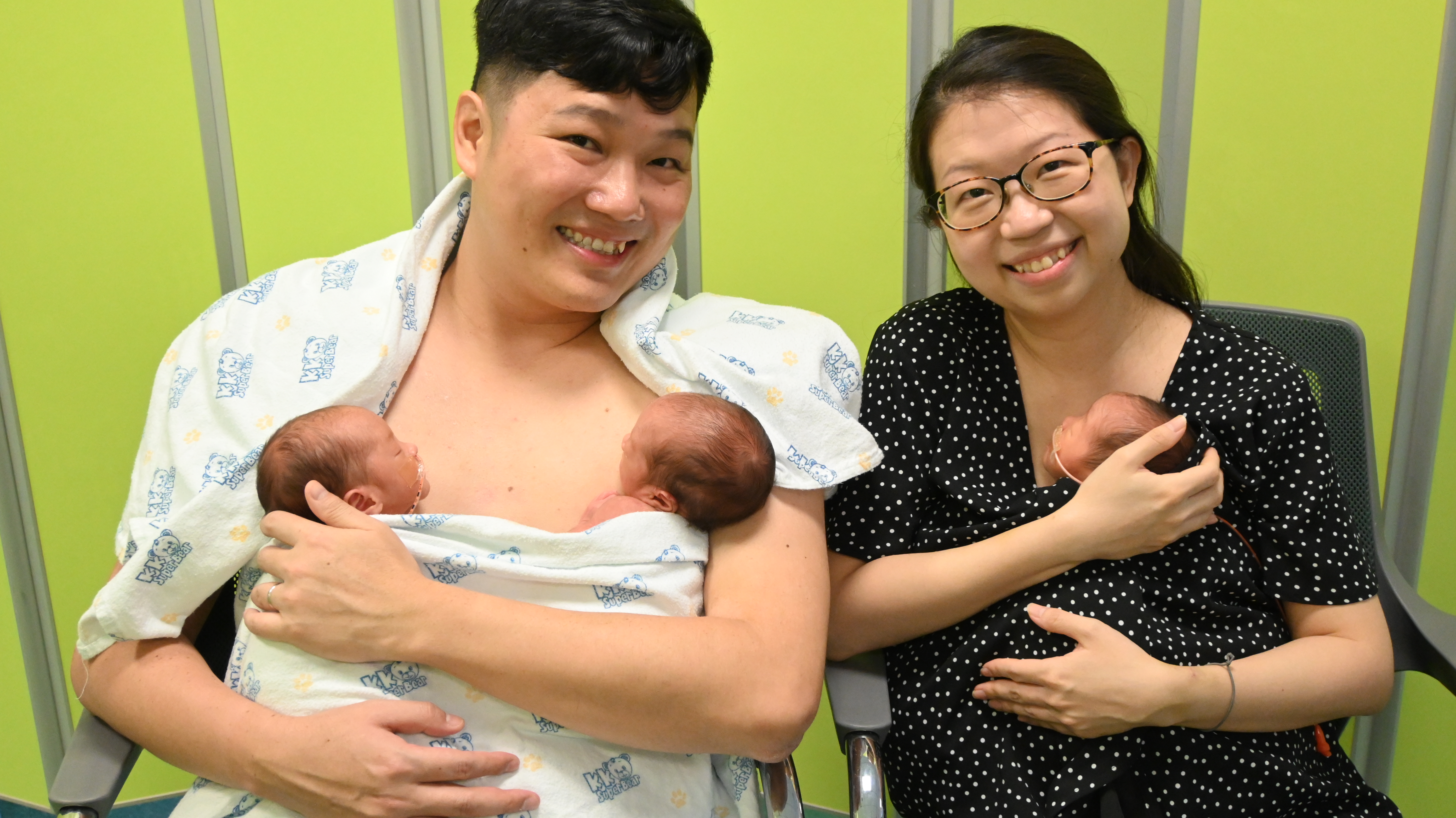 Kangaroo care. Photo from KKH
Kangaroo care. Photo from KKH
With babies, we see them, we hold them. But kangaroo care means doing it skin-to-skin, so [the baby] is on us. So we feel their warmth.
They also put the baby near the left side of our chest, so the baby can hear our heartbeat.
If you asked me to describe the experience, I think it's really feeling life. Just feeling life on me. And knowing that life is from us.
Hozanna: There are also benefits on both ends.
We talk a lot about benefits for the baby. How it helps the body regulate their temperature better, which is something that premature babies especially may not be very good at.
But for the parents as well, there are a lot of emotional benefits.
Before doing kangaroo care, you see them in the cot, in a hospital setting. They may have tubes and all that on them, and you're just very scared to touch them.
It's all very medical.
But when you actually hold the baby, even if there's tubes around....there's this bonding that you can't really explain.
Tian En: We did it every day. Our total accumulated hours were 31 hours and 52 minutes across the 19 days.
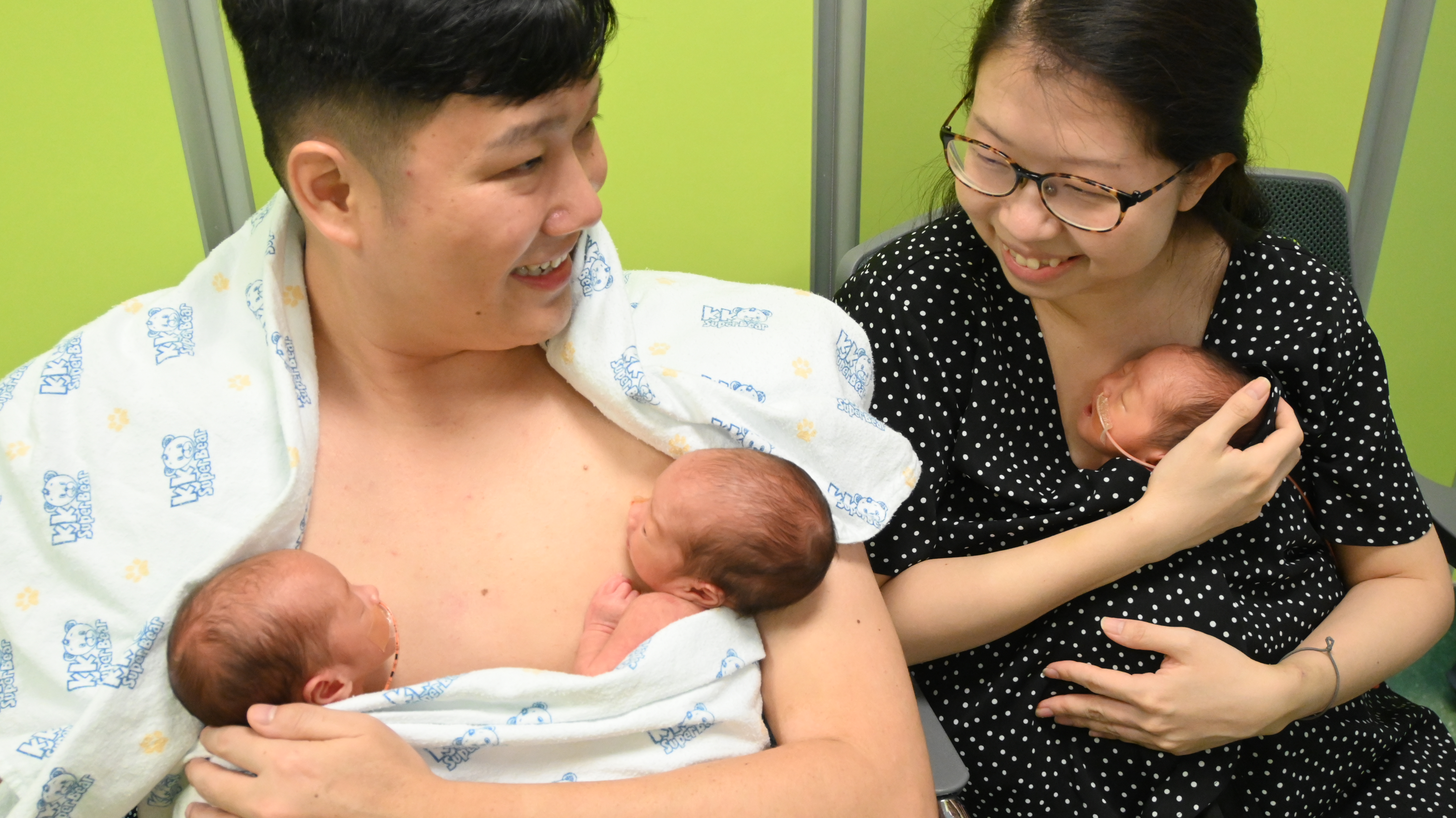 Kangaroo care. Photo from KKH
Kangaroo care. Photo from KKH
Now your babies are home. What are your plans?
Tian En: They're on a three-hour feeding schedule. So if let's say one takes half an hour to feed and burp and change, then three of them is one and a half hours.
Then when we finish everything, the first one starts again. (laughs)
But they're doing fine. This Friday will be the first big challenge, because we'll be bringing all three back to KKH for a follow-up.
It's exciting just thinking about how to move all three babies [to the hospital].
At home they've been fine, they've already hit 3kg plus.
Hozanna: It's just really day by day, the whole schedule of feeding and diaper changing and sleeping.
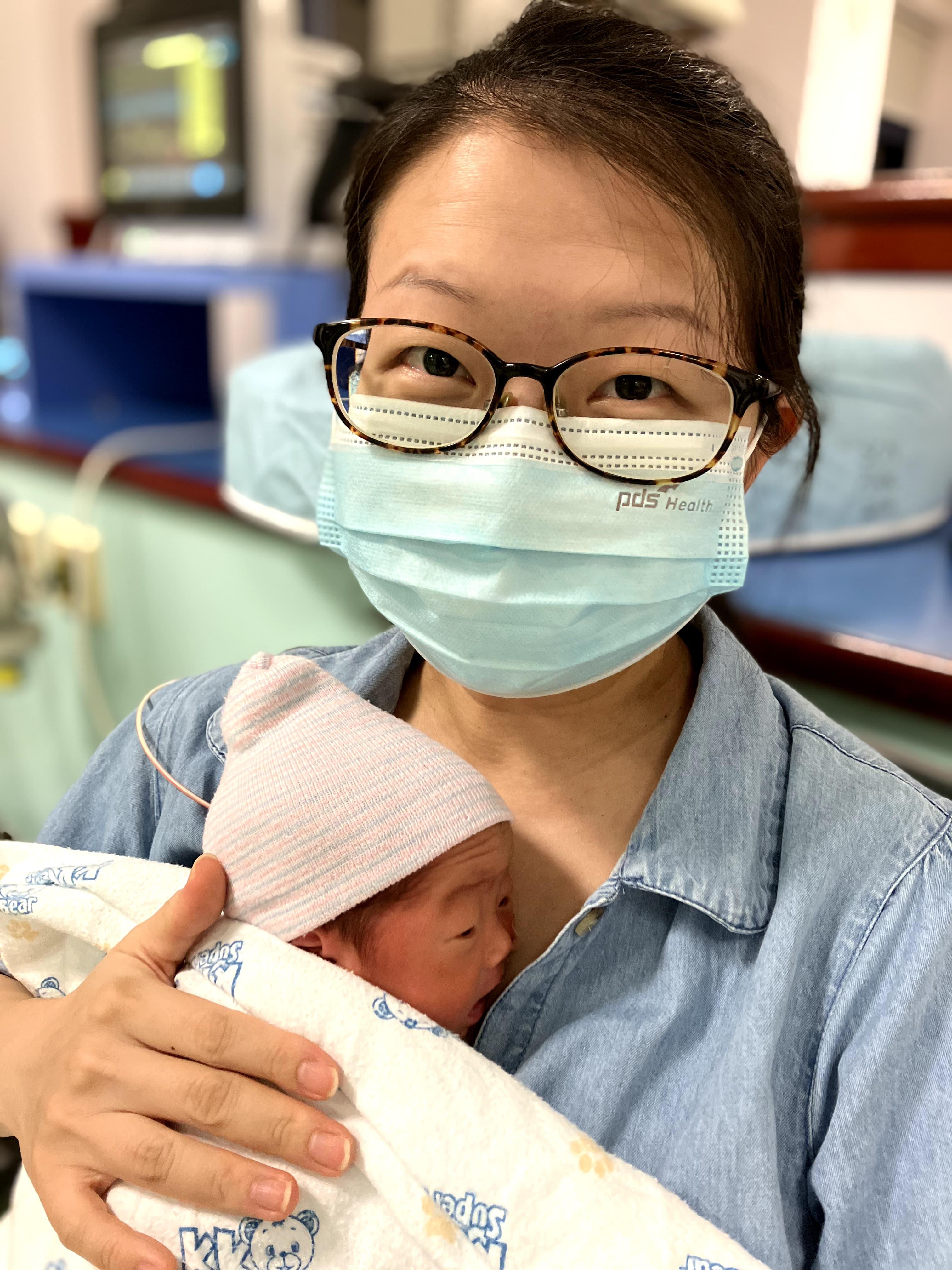 Photo from Hozanna and Tian En
Photo from Hozanna and Tian En
What are some things you didn't expect about having triplets?
Tian En: A question that we got a lot is if one baby cries, do all three cry?
The answer is no. I think they're used to it, so if one cries, the other two don't.
Hozanna: Obviously we've never had children before, so it's not like we can ask people what it's like having three babies.
But a good thing is that even though there's three times the care — diaper changes three times more, feeding three times more, crying also three times more — but when you see their cuteness it's also three times more.
You would think it's very hard to love three babies, or to think about all three of them. Like am I leaving one out, or interacting too much with one of them? But it's been great.
Even when they're older, we might keep worrying about whether we give enough attention to all three. Because even now they have to wait right, like for feeds.
So it's going to be very different from a single-term kind of relationship.
Last question: how did you name the babies?
Tian En: We're Christians, so we wanted to name them something along with our faith. Because it means a lot to us.
We thought of this phrase, "In Christ Alone". So I, C, and A.
Hozanna: When we tell people, some people think it's ICA. (laughs) But it's not government, it's not customs.
Tian En: We also wanted something a bit different. We searched and liked the meaning behind the names.
So Irie, the origin of the word means "harmony".
Caius means "rejoice".
And Aden means "fire".
Hozanna: Because Aden was at the bottom [of the womb]. So I always felt he had to tahan his two siblings, so he's like the fire at the bottom.
Caius would kick and move around a lot. Every time I felt him move, I always felt very happy, like to know know he's there. So his name was very fitting.
And then Irie is just Irie lah. The only girl. (laughs)
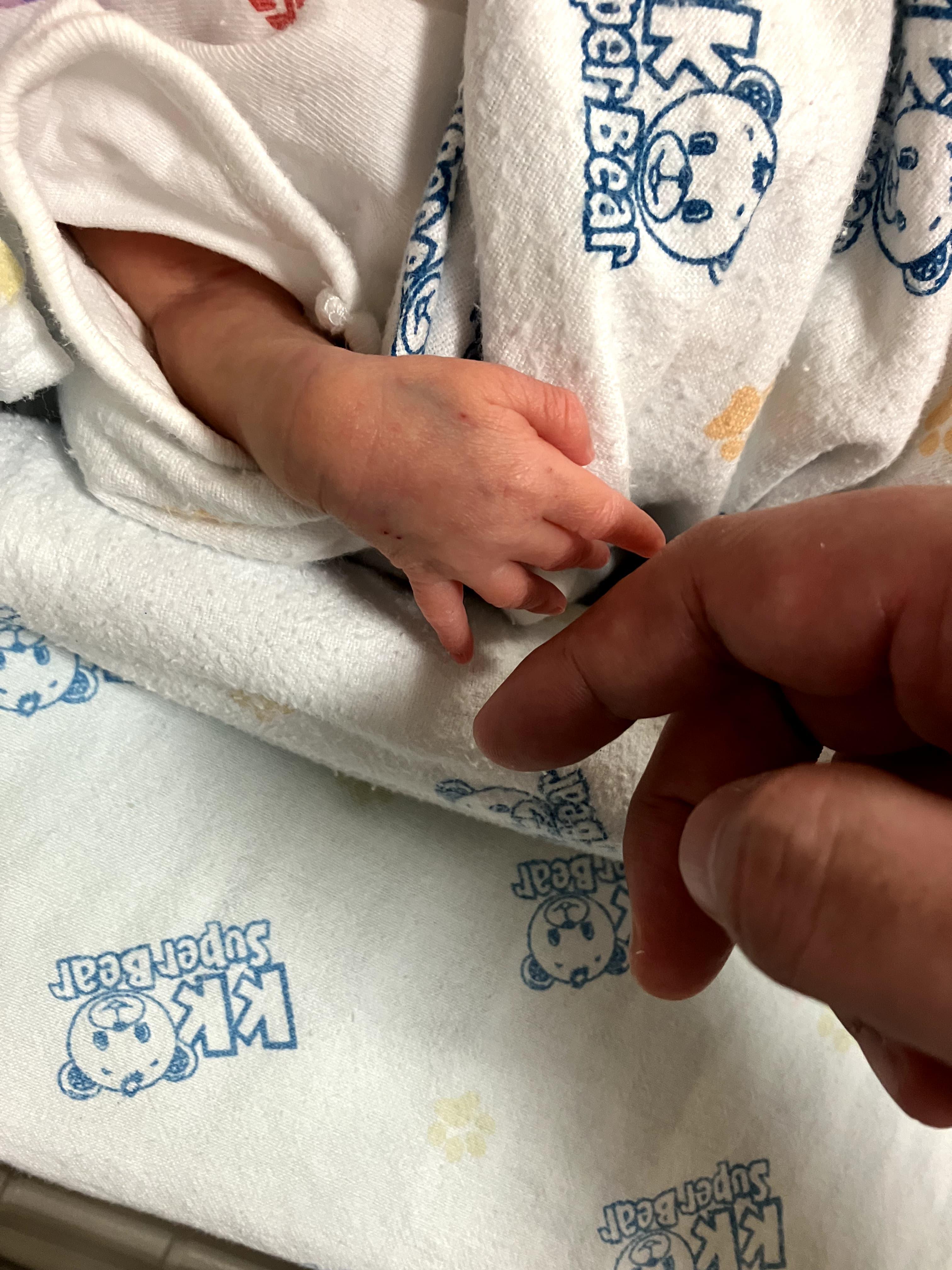 Photo from Hozanna and Tian En
Photo from Hozanna and Tian En
Top image courtesy of Hozanna and Tian En
If you like what you read, follow us on Facebook, Instagram, Twitter and Telegram to get the latest updates.

